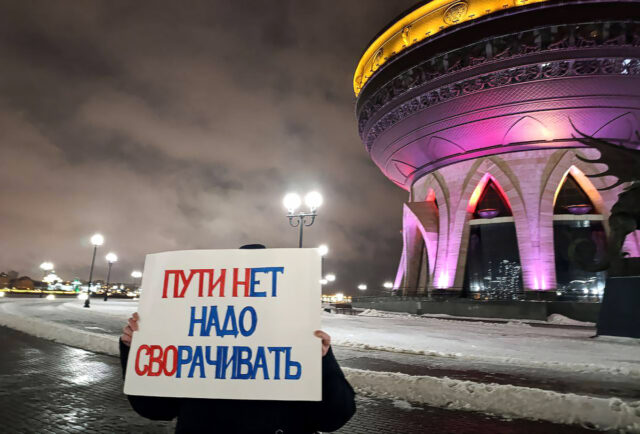
More Russians Oppose the Kremlin’s War Than Officially Known
Publication: Eurasia Daily Monitor Volume: 22 Issue: 140
By:

Executive Summary:
- Human rights activists in Russia believe that the actual number of political prisoners serving time for anti-war views in Russia may be several times larger than is known to human rights organizations.
- Russia’s political prisoners increasingly come from non-political, working-class backgrounds, reflecting the Kremlin’s strategy to instill fear and suppress dissent through unpredictable, arbitrary punishment.
- The existence of such political prisoners and dissent against the war shows that real information about what is happening on the front is penetrating to all levels of the Russian population despite government censorship.
In mid-September, the Russian human rights organization OVD-Info reported on a previously unknown political prisoner, Arina Ivanova of Novokuznetsk. Arina was sentenced to five years of imprisonment for war “fakes,” that is, for critical comments on Russia’s war against Ukraine. Before her arrest, she had no involvement with politics. Human rights activists learned of her sentence only because one of OVD-Info’s employees, who was also from Novokuznetsk, monitored court decisions in her region (Facebook/ovdinfo, September 18).
Human rights activists note that the number of political prisoners in Russia today may be much higher than the official figures of international organizations. The data of the rights activists also differ. The Political Prisoners. Memorial project reports that it provides support to approximately 677 people as of October 21, not counting those persecuted for religious reasons (Political Prisoners. Memorial, accessed October 21). As of October 30, 2024, the “FSIN Archipelago” project reported that 1,198 people were political prisoners, noting that the number of political prisoners for the year had increased by a third (The Insider, October 30, 2024). Meanwhile, OVD-Info reported at the beginning of this year that 1,465 people had been subjected to politically motivated persecution and were currently in custody (Advocacy.ovd.info, January 30). Last year, the co-founder of “Memorial,” Oleg Orlov, noted that in Russia, there are many more political prisoners than those Memorial has registered because rights activists often cannot obtain criminal cases and simply are unaware of them (Radio Svoboda, October 2, 2024).
Leftist sociologist Boris Kagarlitskiy, who is currently incarcerated, shared similar views. In his opinion, the number of those repressed today amounts to tens of thousands of people, and the “collective image of the political prisoner [politzek, политзек]” has assumed a more “national” character. Among the political prisoners he has met in prison, Kagarlitskiy lists a tractor driver, a lathe operator, a security guard, and a truck driver, noting that the authorities “often imprison people simply for expressing a political position, unrelated to any action” (Telegram/@russicaRU, September 29).
The repression of seemingly random people has been going on in Russia for a long time. These arrests, however, did not appear as targeted before the beginning of the full-scale invasion of Ukraine in February 2022. For example, in 2016, the Sverdlovsk Regional Court upheld the sentence of salesclerk Yekaterina Vologzheninova for reposting material against Russia’s “hybrid” incursion in Ukraine in 2016. The woman was pronounced guilty of “inciting hatred and hostility toward government officials and volunteers from Russia fighting on the side of the rebels in eastern Ukraine” and sentenced to community service (Sova-centre.ru, April 26, 2016). Vologzheninova was not involved in politics either before or after her criminal case. A year earlier, the security services tried to make a criminal case of treason against Svetlana Davydova for telephoning the Embassy of Ukraine. The woman had accidentally heard on a minibus that a new batch of Russian troops might have been sent to Ukraine (ВВС–Russian Service, March 13, 2015). Such cases, however, were still rare at this point.
The current wave of repression among ordinary, apolitical people, on the one hand, serves to intimidate society. Kagarlitskiy noted that, unlike in the late Soviet era, the Russian government has not defined any rules of the game, and people are unable to determine the degree of risk or understand what exactly is prohibited today (Telegram/russicaRU, September 29). On the other hand, the number of unknown political prisoners demonstrates that the number of people who openly disagree with Kremlin policy is higher than commonly thought. It is impossible to confirm that all these people harbor anti-war views. Information critical of the war is leaking into Russian society in various ways, including pro-war channels established by war correspondents who criticize specific aspects of the Russian military’s operations but generally support the invasion (Holod, July 10).
Some Russians have personal involvement in the war, such as the wives of mobilized troops. Not all of them oppose the war as a whole, and often their demands are limited to calls to return their husbands home (see EDM, November 27, December 11, 2023, April 16, 2024; Radio Svoboda, January 16). Some Russians get information critical of the war from returning Russian soldiers who often do not change their views but tell their families about extortion, murder, and other crimes committed by their own command (Censor.net, September 27). Those living in regions bordering Ukraine also exhibit a high degree of dissatisfaction with the government’s lack of support (Deutsche Welle–Russian Service, January 18). Any such criticism could serve as grounds for repression.
The number of people in Russia who are not susceptible to propaganda is higher than one might think. According to the Ukrainian state-run project “I Want to Find (Khochu naiti, Хочу найти),” created to search for Russian soldiers killed or captured in Ukraine, nearly 128,000 Russians have contacted them as of September 1 (Facebook/hochunaiti, September 1). This, at a minimum, means that some relatives of Russian servicemen are more likely to trust the Ukrainian state than Russian military commissariats and military units when it comes to finding their loved ones.
Such indirect indicators in time might more accurately reveal real public sentiment than sociological surveys. Moreover, they show that a “hidden disloyalty” is rising in Russia’s hinterlands among ordinary people and even among relatives of Russian soldiers.



